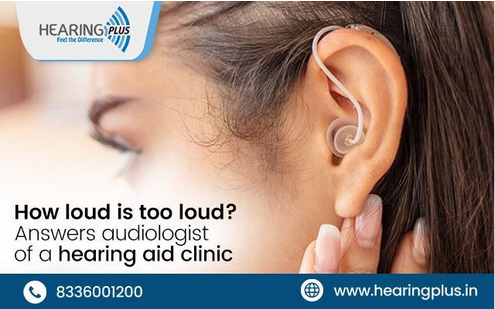Do you know that constant exposure to noise can cause hearing loss? An audiologist of a hearing aid clinic what decibel of sound damages the ears.
Sound is all around us, from the loud noises of traffic to the chatter of a busy restaurant. But how loud is too loud? It’s important to know the answer because prolonged exposure to loud noise can cause permanent damage to your hearing. In this blog post, we’ll get to know what level of loudness can be harmful to your hearing from an audiologist of hearing aids clinic.
Understanding what sound decibel can cause hearing issues
Sound is measured in decibels (dB), and the louder the sound, the higher is the decibel. Normal conversation sound is around 60 dB, while a rock concert can be around 110 dB. Exposure to sounds at 120 dB or higher can cause immediate hearing damage. However, it’s not just the loudness of the sound that matters but also the duration of exposure. Sounds that are too loud can cause hearing loss if you are exposed to them for a prolonged period of time.
An audiologist at a hearing aids centre in Bhubaneswar stated that sounds that are above 85 dB can cause hearing loss if you are exposed to them for a prolonged period of time. This includes sounds like traffic and music from headphones. Moreover, if you are exposed to sound above 100 dB, your hearing can be damaged very quickly. Sound at this level is equivalent to a jackhammer or a thunderclap, and it can cause immediate and permanent hearing damage.
Exposure to loud sounds can cause noise-induced hearing loss (NIHL), which can be temporary or permanent. The damage accumulates over time, and the first sign is often a ringing or buzzing sound in the ears called tinnitus.
Signs that your hearing health is at risk
If you are regularly exposed to loud sounds, there are several signs that your hearing health may be at risk. These include:
- A constant ringing and buzzing sound in the ears
- Struggling to hear conversations or other sounds, even in relatively quiet environments.
- Sound seems muffled or distorted and you have trouble understanding speech.
- Aloud sounds or becoming uncomfortable and irritated when exposed to them.
- Experiencing any pain or discomfort in your ears after exposure to loud sounds, it could be a sign of damage.
If you experience any of these signs, it’s important to see an audiologist at a hearing aids clinic as soon as possible. They will evaluate your hearing and recommend the necessary treatment.
Protect your hearing from loud noise exposure
If you want to protect your hearing from loud noise, there are several steps you can take.
- If you are exposed to loud sounds for an extended period, take regular breaks to give your ears a rest.
- When listening to music or watching TV, try to keep the volume at a reasonable level.
- If you know you will be exposed to loud sounds, such as at a concert or in a noisy workplace, wear hearing protection such as earplugs or earmuffs.
Regular hearing checks with an audiologist of a hearing aid centre can help you identify any changes in your hearing.
Conclusion
Remember that hearing loss is preventable, so take care of your ears and avoid loud noises.
Patient Review
“I am too satisfied with hearing plus. Each staff is very good in behaviour.
- Paltu Shaw


Hi there! Someone in my Myspace group shared this website with us so I came to give it a look. I’m definitely enjoying the information. I’m book-marking and will be tweeting this to my followers! Superb blog and fantastic design.
I just could not depart your site before suggesting that I really enjoyed the standard info a person provide for your visitors? Is gonna be back often to check up on new posts
relaxing jazz
study music
soft music
relaxing october jazz
relaxing music
Nice post. I learn something more challenging on different blogs everyday. It will always be stimulating to read content from other writers and practice a little something from their store. I’d prefer to use some with the content on my blog whether you don’t mind. Natually I’ll give you a link on your web blog. Thanks for sharing.
cafe
winter jazz music
Would love to constantly get updated outstanding web blog! .
jazz
relaxing jazz music
I do love the manner in which you have framed this challenge and it does indeed give me personally some fodder for thought. On the other hand, from what precisely I have observed, I simply hope as the actual comments stack on that men and women keep on point and don’t embark upon a soap box of some other news of the day. Anyway, thank you for this excellent point and even though I do not really agree with the idea in totality, I value the point of view.